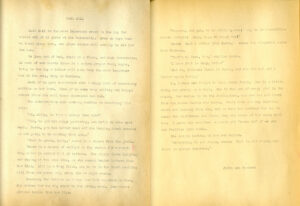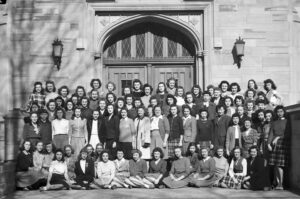“Never, never, never believe any war will be smooth and easy, or that anyone who embarks on that strange voyage can measure the tides and hurricanes he will encounter.” — Sir Winston Churchill in My Early Life: A Roving Commission
War is never easy, especially for those serving in the armed forces and those they leave behind. Throughout the various wars in our short history, our military members and their loved ones have made countless sacrifices in order to defend our country and protect the freedoms which we all enjoy so dearly. Separation from our loved ones can be a particularly difficult thing to bear during these times of conflict.
But whereas we now have email, skype, and various other methods of communication to keep in touch with those on the battlefield, there were no such luxuries in the Second World War. People relied on snail

-mail to receive news from the frontlines which, in some areas, could be less than frequent. Letters could easily be lost in the mail as well.
Letters to and from the front lines were a lifeline for service men and women fighting in WWII. One can imagine these soldiers clinging desperately to photos of their loved ones and sitting in their shelters or in the trenches reading and rereading those letters from home dozens of times over. All the while sitting. Waiting. Hoping for the end of hostilities so that they can once again return to their former lives.
It was no different for those at home. One can be sure that many individuals sat by the mail box waiting with bated breath as the postman came up to deliver the mail, hoping to hear some news from the front. Students at Indiana University seem to have been no exception to this rule. While I was processing a set of scrapbooks from Sycamore Hall (when it acted as a women’s residence hall), I stumbled upon this little gem embedded in Volume 5 of the Sycamore Logbook from the 1944-1945 academic year whose faded pages revealed what was going through many a young woman’s mind here at IU when it came time to receive the mail during WWII.
The following is a transcription of an account written by one of the copy editors of the Sycamore Hall dorm logbook:

Archives image no: P0044228
Mail Call
Mail Call is the most important event in the day for almost all of us girls at the University. Even on days when we could sleep late, our alarm clocks will usually be set for ten a.m.
We jump out of bed, dress in a flash, and dash downstairs. In each of our hearts there is a solemn prayer that, maybe, today is the day a letter will come from the most important man in the Army, Navy or Marines.
Each of us goes downstairs with a happy look of expectancy written on her face. Some of us come away smiling and happy; others leave the mail boxes depressed and sad.
The conversation each morning rambles on something like this:
“Hi, Kelly, is that a letter from Bob?”
“Yes, he got his wings yesterday, and he’ll be home next week. Barbs, you had better dust off the Wedding March because we are going to be needing that song.”
“That is grand, Kelly,” comes in a chorus from the girls.
There is a scream of delight as Kay rushes for her mail box, which is packed full of letters. She stands there laughing and crying at the same time, as she counts twelve letters from her Bill. Bill is a Navy flier, and he is in the South Pacific; mail from him comes only every six or eight weeks.
Cluching [sic] the letters as though her life depended on them, Kay dashes for the big chair in the living room. Incoherent phrases tumble from her lips.
“Jeepers, and gee, he is still my man! Oh, his is wonderful – – twelve letters! Happy day, oh happy day!”
“Darn! Just a letter from Carol,” comes the disgusted words from Ruthann.
“That’s my luck, too,” replies Donna.
“I know Dick is busy, but – -“
“Cut it, Ruthann; there is Janie, and she did not get a letter again today.”
No, I must not forget to tell about Janie. She is a little thing and pretty as a doll. She is the pet of every girl in the house. Her Marine is in the Philippines, and she has not heard from him since Manila was taken. Janie does not say anything about not hearing from him, but we know how worried she is; we sense the heartbreak she feels when she looks at her empty mail box. I guess she realizes we would all “crack up” if we put our feelings into words.
She saw us looking at her and smiled.
“Everything is all right, chums; Jack is all right, and there is always tomorrow.”
Julia Ann Bookout
Little did these ladies know that they did not have long to wait for their loved ones to return. The war would soon come to an end with the Japanese surrender on August 15, 1945 with the formal surrender to follow on September 2nd (which is known today in the US as V-J Day). We can only hope that Jack returned with the rest of his brothers in arms to US shores to celebrate the Allied victory with Janie and the rest of his family and friends.
Leave a Reply